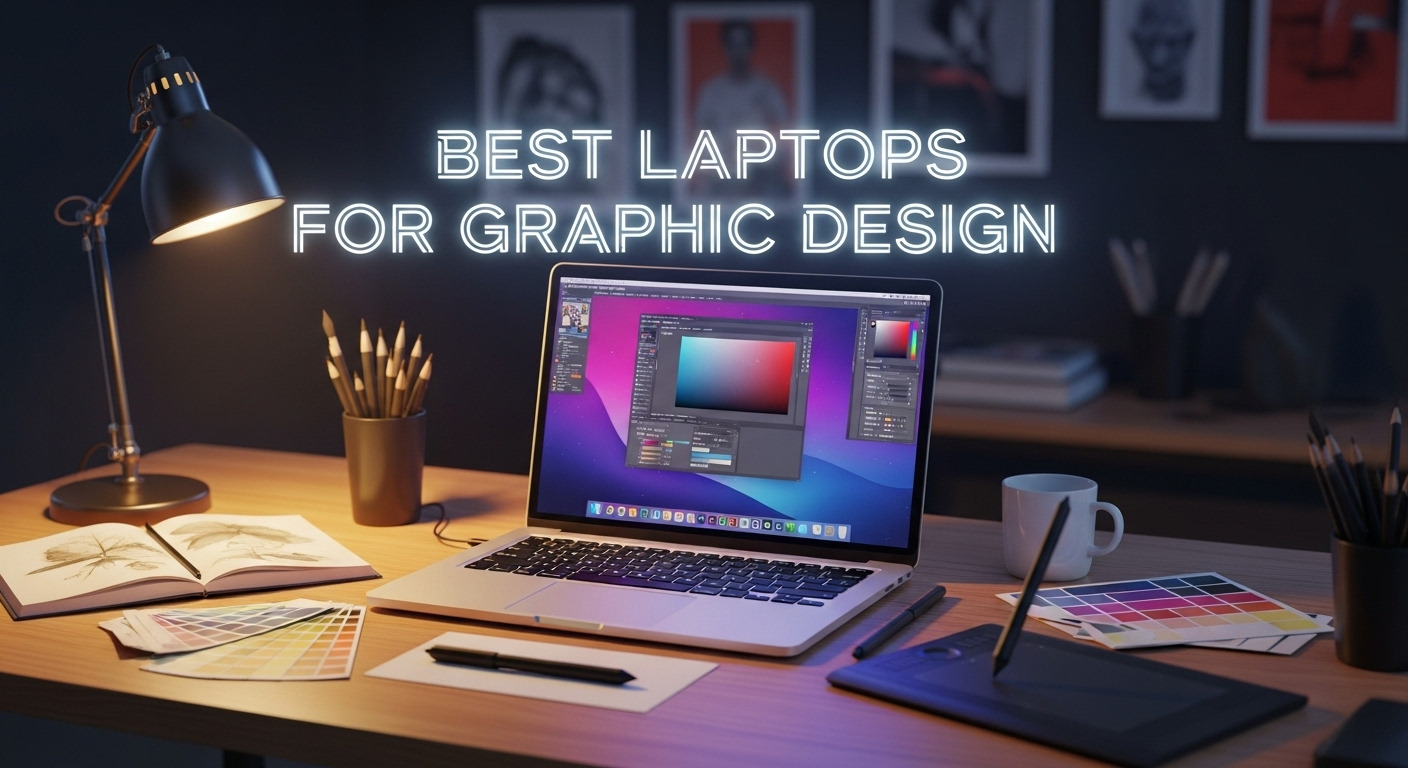

Finding the perfect laptop for graphic design requires balancing powerful performance, color-accurate displays, and reliable build quality. Whether you’re creating logos in Illustrator, editing photos in Photoshop, or designing layouts in InDesign, the right machine can transform your creative workflow.
We’ve thoroughly evaluated 10 leading laptops specifically for graphic design work in January 2026. Our selection includes everything from Apple’s M4-powered MacBooks to Windows workstations with dedicated graphics cards. Each laptop has been assessed for display quality, color accuracy, performance with creative software, and overall value for design professionals.
| Laptop Model | Key Spec | Best For | Check Price |
|---|---|---|---|
| Apple MacBook Pro M4 Pro | 14.2″ Liquid Retina XDR | Professional Design Work | Amazon |
| Apple MacBook Air M4 15″ | 15.3″ Liquid Retina Display | Portable Design | Amazon |
| ASUS ProArt P16 | 16″ 4K OLED Touchscreen | Creative Professionals | Amazon |
| ASUS ProArt PX13 2-in-1 | 13.3″ 3K OLED Touch | Mobile Design Work | Amazon |
| Lenovo Legion Pro 7i | 16″ OLED 240Hz | High-End Creative | Amazon |
| Dell XPS 13 9345 | 13.4″ FHD+ 120Hz | Everyday Design | Amazon |
| MSI Cyborg 15 AI | 15.6″ FHD 144Hz | Budget Gaming Design | Amazon |
| Surface Pro 2-in-1 | 13″ OLED Touchscreen | Versatile Creative | Amazon |
| HP ZBook Studio | 15.6″ IPS FHD | Professional Workstation | Amazon |
| Acer ConceptD 3 Ezel | 14″ Pantone Validated | Artist Convertible | Amazon |
Display quality stands as the most crucial factor when selecting a laptop for graphic design. You’ll want to prioritize color accuracy with at least 100% sRGB coverage, preferably extending to Adobe RGB for print work. Screen size matters too – 15-16 inch displays provide the workspace most designers need, though 13-14 inch options work for mobile creatives.
Processing power comes next, with modern CPUs handling design software efficiently. However, dedicated graphics cards accelerate tasks like 3D rendering, complex filters, and video work. RAM requirements start at 16GB but 32GB proves ideal for large files and multiple applications. Storage should be SSD-based for quick file access, with 512GB as the minimum and 1TB recommended for extensive asset libraries.
Build quality and connectivity round out the essentials. Look for sturdy construction that survives daily transport, quality keyboards for extended use, and ports that connect to external monitors, tablets, and storage devices without dongles.
The MacBook Pro M4 Pro delivers exceptional performance for graphic design work at $1,699.00 (down from $1,999.00). The Apple M4 Pro chip with its 12-core CPU and 16-core GPU handles complex Photoshop operations, vector illustrations, and even video editing with remarkable efficiency. The 24GB of unified memory ensures smooth multitasking between Creative Suite applications.
The 14.2-inch Liquid Retina XDR display excels with precise color reproduction, making it ideal for client presentations and accurate design work. The screen’s brightness and contrast help distinguish subtle color variations crucial in professional design. Battery life extends through full workdays, while the premium build quality justifies the investment for serious creatives.
Apple’s ecosystem integration streamlines workflows, especially when paired with iPad design work or iPhone photography. The machine runs silently under typical design workloads, making it perfect for client meetings or shared workspaces. This MacBook represents the gold standard for design laptops in 2026.
At $1,049.00 (reduced from $1,199.00), the MacBook Air M4 15-inch offers impressive design capabilities in a lightweight package. The M4 chip with 10-core CPU and 10-core GPU provides solid performance for most graphic design tasks, while the 16GB unified memory handles moderate multitasking well.
The 15.3-inch Liquid Retina display provides excellent color accuracy for design work, though it lacks the extreme brightness of the Pro model. The larger screen real estate compared to 13-inch models improves productivity for layout design and detailed illustration work. The fanless design operates silently, ideal for focused creative sessions.
Portability stands as this MacBook’s strongest advantage – weighing just 3.3 pounds makes it perfect for designers who work between locations. Battery life extends beyond 15 hours for typical design work, eliminating charging anxiety during long creative sessions. For freelancers and students, this machine delivers professional-grade design capabilities at a more accessible price point.
The ASUS ProArt P16 at $2,199.99 targets serious creative professionals with its impressive specification sheet. The AMD Ryzen AI 9 HX 370 processor delivers exceptional multi-core performance for complex design tasks, while the RTX 4060 8GB accelerates GPU-intensive operations like 3D rendering and video effects.
The standout feature is the 16-inch 4K OLED touchscreen, offering vibrant colors and deep blacks that make design work visually stunning. The touch capability adds intuitive interaction for digital sketching and precise adjustments. With 32GB LPDDR5X RAM, this laptop handles the largest design files and multiple Creative Suite applications simultaneously without slowdowns.
However, early user reports indicate potential software reliability issues that required complete system reinstalls. The limited review history makes long-term reliability difficult to assess. For established design studios willing to manage potential setup challenges, the hardware specifications make this a compelling professional workstation.
The ASUS ProArt PX13 at $1,849.99 combines powerful performance with maximum portability in its 2-in-1 design. The Ryzen AI 9 HX 370 processor provides desktop-class performance in a compact form factor, while the RTX 4050 6GB handles moderate 3D work and accelerates creative applications effectively.
The 13.3-inch 3K OLED touchscreen delivers exceptional color accuracy and brightness at 500 nits, crucial for precise design work. The convertible design transforms from laptop to tablet mode, enabling natural digital sketching and client presentations. The 32GB LPDDR5X RAM ensures smooth operation even with memory-intensive design projects.
The compact size makes it ideal for designers who prioritize mobility without sacrificing performance. Windows 11 Pro adds professional features valuable for business environments. However, the smaller screen requires external monitors for extended design sessions, and the single positive review limits confidence in real-world performance assessment.
The Lenovo Legion Pro 7i at $3,549.99 represents the pinnacle of laptop performance for demanding creative work. The Intel Core Ultra 9 275HX with 24 cores provides exceptional processing power for complex 3D rendering, video editing, and multi-application workflows. The RTX 5090 with 24GB VRAM handles the most demanding creative tasks with ease.
The 16-inch OLED display at 2.5K resolution and 240Hz refresh rate delivers stunning visual quality for design work. The 500-nit brightness ensures clear visibility in various lighting conditions. The color accuracy and contrast make it suitable for professional color-critical work, though specific color gamut coverage isn’t detailed in available specifications.
The 32GB DDR5-6400 RAM handles large design files smoothly, though some users note that 64GB would benefit AI workloads and extremely complex projects. The Legion Coldfront vapor cooling system maintains performance under sustained creative workloads. This laptop suits established design studios requiring maximum performance and willing to invest in premium hardware.
The Dell XPS 13 at $1,299.99 (down from $1,699.99) offers impressive efficiency for mobile design work. The Snapdragon X Plus processor provides solid performance for everyday design tasks while delivering exceptional battery life up to 27 hours. The ARM architecture brings unique efficiency benefits though potential software compatibility considerations exist.
The 13.4-inch FHD+ display at 120Hz provides smooth scrolling and responsive touch interaction. The 500-nit brightness ensures visibility in various working environments. The thin and light design makes it extremely portable for designers who work across multiple locations or travel frequently.
The 16GB LPDDR5x RAM handles moderate design workloads effectively, though heavy multitasking might push its limits. The 512GB SSD provides fast storage access for design files. However, the ARM-based processor may face compatibility issues with some older design software or specialized plugins. For designers who prioritize portability and work primarily with modern, ARM-compatible applications, this laptop offers exceptional value.
The MSI Cyborg 15 at $1,399.99 provides solid creative performance at a competitive price point. The Intel Core Ultra 7 155H processor handles design applications efficiently, while the RTX 4060 8GB accelerates GPU-intensive tasks like 3D rendering and video effects processing.
The 15.6-inch Full HD display at 144Hz offers smooth visual experience, though color accuracy specifications aren’t detailed in available information. The high refresh rate benefits motion graphics work and provides responsive interaction with design software. The 64GB RAM configuration is exceptional at this price point, enabling smooth operation with large design files and multiple applications.
The 1TB SSD provides ample storage for design assets and project files. However, the lack of customer reviews makes real-world performance assessment challenging. The translucent black design adds visual appeal for younger designers. For budget-conscious creatives who need substantial RAM and decent graphics performance, this laptop presents compelling value, though verification of display quality would be advisable before purchase.
The Surface Pro 2-in-1 at $1,369.00 (reduced from $1,699.99) excels in versatility for creative professionals. The Snapdragon X Elite 12-core processor provides efficient performance while delivering exceptional battery life that genuinely lasts through extended creative sessions. The ARM architecture brings efficiency benefits though requires consideration of software compatibility.
The 13-inch OLED touchscreen delivers beautiful color reproduction and contrast ideal for design work. The touch interface enables natural digital sketching and precise design adjustments. The 2-in-1 form factor transforms seamlessly between laptop and tablet modes, accommodating different creative workflows and client presentation scenarios.
The 16GB RAM handles moderate design workloads effectively, while the 1TB storage provides ample space for design assets. However, the keyboard and Surface Pen are sold separately, adding significant cost to the total package. The ARM processor may encounter compatibility issues with some specialized design software. For designers who value flexibility and primarily use modern, ARM-compatible applications, this device offers unique creative capabilities.
The HP ZBook Studio at $999.99 targets professional designers seeking workstation-grade reliability. The Intel Core i7-11850H vPro processor, while from an older generation, provides solid performance for design applications with enhanced security features valuable in corporate environments. The NVIDIA T1200 4GB offers professional-grade graphics acceleration.
The 15.6-inch IPS FHD display provides consistent color reproduction, though specific color gamut coverage isn’t detailed in available specifications. The workstation-grade build quality ensures durability for daily professional use. The 32GB DDR4 RAM enables smooth operation with large design files and complex projects.
Professional features include vPro management capabilities, fingerprint reader security, and Thunderbolt 4 connectivity for high-speed peripherals. However, the 11th generation processor shows its age compared to current offerings, and the lack of customer reviews limits real-world performance assessment. For corporate environments requiring proven reliability and security features, this workstation offers solid value despite older components.
The Acer ConceptD 3 Ezel at $1,598.00 (used condition) stands out with its unique design approach for digital artists. The innovative Ezel hinge system allows multiple positioning modes, making it exceptionally versatile for sketching, client presentations, and traditional laptop use. The engineering quality of this hinge system receives consistent praise from users.
The 14-inch Pantone validated display with 100% sRGB coverage ensures accurate color reproduction crucial for professional design work. The matte touchscreen finish reduces glare and provides natural drawing feel with the included Wacom AES 1.0 pen. The GTX 1650 graphics card, while older, handles 2D design work and light 3D tasks adequately.
The 10th generation Intel Core i7-10750H processor and 16GB RAM show their age but remain capable for most design applications. However, battery life suffers under heavy usage, and some users report inconsistencies with the fingerprint reader. For digital artists who prioritize the unique convertible design and color-accurate display, this laptop offers compelling functionality despite older hardware specifications.
Best Under $1,100: Apple MacBook Air M4 15-inch – At $1,049, it delivers professional color accuracy and performance in a portable package that rivals more expensive options.
Best $1,100-$1,700: Dell XPS 13 9345 – The exceptional battery life and premium build quality make it ideal for mobile designers, despite ARM compatibility considerations.
Best $1,700-$2,500: Apple MacBook Pro M4 Pro – The gold standard for design professionals, offering top-tier performance, display quality, and reliability.
Best Premium Option: Lenovo Legion Pro 7i – At $3,549, it provides maximum performance for studios handling the most demanding creative projects and requiring future-proofing.
| Model | CPU | GPU | RAM | Display | Price |
|---|---|---|---|---|---|
| MacBook Pro M4 Pro | M4 Pro 12-core | 16-core GPU | 24GB | 14.2″ XDR | $1,699 |
| MacBook Air M4 15″ | M4 10-core | 10-core GPU | 16GB | 15.3″ Retina | $1,049 |
| ASUS ProArt P16 | Ryzen AI 9 HX 370 | RTX 4060 8GB | 32GB | 16″ 4K OLED | $2,199 |
| ASUS ProArt PX13 | Ryzen AI 9 HX 370 | RTX 4050 6GB | 32GB | 13.3″ 3K OLED | $1,849 |
| Legion Pro 7i | Core Ultra 9 275HX | RTX 5090 | 32GB | 16″ OLED 240Hz | $3,549 |
| Dell XPS 13 | Snapdragon X Plus | Integrated | 16GB | 13.4″ FHD+ | $1,299 |
| MSI Cyborg 15 | Core Ultra 7 155H | RTX 4060 8GB | 64GB | 15.6″ FHD | $1,399 |
| Surface Pro | Snapdragon X Elite | Integrated | 16GB | 13″ OLED | $1,369 |
| HP ZBook Studio | Core i7-11850H | T1200 4GB | 32GB | 15.6″ FHD | $999 |
| ConceptD 3 Ezel | Core i7-10750H | GTX 1650 | 16GB | 14″ Pantone | $1,598 |
What’s the minimum RAM needed for graphic design in 2026?
16GB serves as the practical minimum for modern graphic design work, handling most Photoshop and Illustrator tasks effectively. However, 32GB provides noticeably better performance with large files, complex compositions, and multitasking between applications. The MacBook Pro M4 Pro’s 24GB unified memory offers an excellent middle ground.
Do I need a dedicated graphics card for graphic design?
For 2D design work like logos, layouts, and photo editing, integrated graphics suffice. However, dedicated GPUs accelerate tasks like 3D rendering, complex filters, video editing, and real-time previews. The RTX 4060 in the ASUS ProArt P16 exemplifies solid creative performance without overkill.
Mac vs PC for graphic design – which is better?
Both platforms excel at graphic design, with choice often depending on workflow preferences. Macs offer seamless Creative Suite integration, excellent color management, and superior build quality. PCs provide more hardware variety, better price-to-performance ratios, and wider software compatibility. The MacBook Pro M4 Pro represents Mac excellence, while the ASUS ProArt series showcases PC capabilities.
Is OLED worth it for design work?
OLED displays deliver superior contrast and color vibrancy that benefits design work significantly. However, color accuracy matters more than contrast for professional work. The ASUS ProArt laptops with OLED screens combine both benefits, while the MacBook Pro’s Liquid Retina XDR provides excellent accuracy with high contrast.
How much storage do graphic designers need?
512GB serves as the minimum, with 1TB recommended for most designers. Large design files, asset libraries, and project archives consume substantial space quickly. Cloud storage can supplement local storage, but fast local access remains important for active projects.
What display size is best for graphic design?
15-16 inch displays provide the optimal balance of screen real estate and portability for most designers. The 14-inch MacBook Pro works well but feels cramped for complex layouts. The 16-inch ASUS ProArt P16 offers maximum workspace without becoming unwieldy.
Can budget laptops handle professional graphic design?
Budget laptops can handle basic design work but struggle with complex projects, multiple applications, and professional workflows. The HP ZBook Studio at $999 represents the minimum for serious professional work, while options under $800 suit students and hobbyists better.
How important is color accuracy for graphic design?
Color accuracy is crucial for professional work, especially when designs will be printed or viewed across different devices. Look for displays with 100% sRGB coverage minimum, with Adobe RGB support beneficial for print work. The ConceptD 3 Ezel’s Pantone validation ensures professional color standards.
Should I prioritize CPU or GPU for design work?
CPU performance generally matters more for most graphic design tasks, handling application responsiveness, file processing, and multitasking. GPU acceleration benefits specific tasks like 3D work, video editing, and filter processing. The MacBook Pro M4 Pro’s balanced approach excels across all scenarios.
What ports do graphic designers need?
Thunderbolt 4 or USB-C with video output enables high-resolution external monitors. USB-A ports connect legacy peripherals like drawing tablets. SD card slots benefit photographers. HDMI output provides display flexibility. The variety in modern laptops generally covers most needs, though dongles may be required for comprehensive connectivity.
After reviewing these 10 graphic design laptops in January 2026, here are my top recommendations:
Best Overall Graphic Design Laptop: Apple MacBook Pro M4 Pro 14-inch The exceptional M4 Pro performance, stunning Liquid Retina XDR display, and professional build quality make it perfect for serious design work. At $1,699, it provides the ideal balance of performance, portability, and reliability that professional designers demand.
Best Value: Apple MacBook Air M4 15-inch
For budget-conscious creatives, this design notebook delivers impressive color accuracy and smooth performance at $1,049. The larger 15-inch screen and exceptional battery life make it practical for extended design sessions.
Best for Digital Artists: Acer ConceptD 3 Ezel If you prioritize sketching and convertible functionality, the innovative Ezel hinge design and Pantone-validated display create an exceptional drawing experience. The included pen and multiple positioning modes cater specifically to digital artists.
Best High-Performance Option: Lenovo Legion Pro 7i For established studios requiring maximum creative power, the RTX 5090 graphics and stunning OLED display handle the most demanding projects with ease.
Choose based on your specific workflow needs, budget constraints, and portability requirements. Each laptop excels in different scenarios while maintaining the essential capabilities that graphic design professionals require in 2026.

